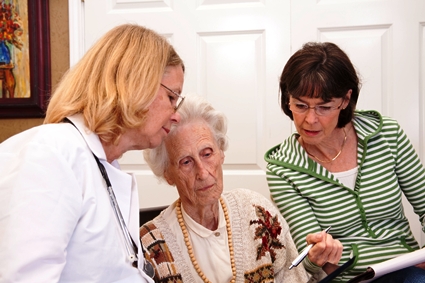
I recently attended a conference on patient engagement where one of the speakers discussed the growth projections of chronic illness in the U.S., describing the dire consequences it will have on our health delivery system if unaddressed. The primary implication was one of scale. For example, how will we as a system respond when confronted with a population that could see as much as a 33% increase in diabetes over the next couple of decades? Even if only directionally correct, the numbers are alarming.
Care Management: an Issue of Scale
Demographics and health trends clearly point to the fact that the number of individuals diagnosed with a c hronic disease will rise over the coming years. As provider organizations continue to assume more risk, implementing sophisticated care management strategies becomes an operational imperative. However, these initiatives are labor intensive and costly. Furthermore, unless we can get ahead of the curve and begin addressing the ‘rising risk’ population of people who are likely to become ill,the problem will only compound over time. The issue, then, is how do we change people’s behavior to support better outcomes in a scalable, cost-effective manner?
hronic disease will rise over the coming years. As provider organizations continue to assume more risk, implementing sophisticated care management strategies becomes an operational imperative. However, these initiatives are labor intensive and costly. Furthermore, unless we can get ahead of the curve and begin addressing the ‘rising risk’ population of people who are likely to become ill,the problem will only compound over time. The issue, then, is how do we change people’s behavior to support better outcomes in a scalable, cost-effective manner?
Artificial Intelligence: A Brave New World?
This particular presenter, who was speaking on behalf of a vendor, espoused that artificial intelligence and the use of virtual assistants is the answer. For those not familiar with this technology, think about the scene from 2001: A Space Odyssey when the ship’s computer (named Hal) uttered that famous line,“Good morning Dave…” For those of you too young to remember the movie or who can’t envision a time when 2001 seemed like a date far into the future, imagine Siri becoming your virtual health coach, reminding you to take your meds, measure your blood pressure, jump on that scale! Technology can and will play an important role in the future of care communications. Solutions like mobile apps, text alerts and social networking will all serve a purpose. In fact, virtual assistants may prove to be an effective means to engage patients and influence behavior. However, I don’t think that technology alone will prove to be the answer. At the end of the day, I can ignore a text reminder, delete an app, and turn off my ‘virtual coach.’ But… I cannot ignore my wife.
Personal Support Networks
In order to manage the anticipated growth in chronic illness and address the problem of scale, we ![Senior woman visiting with her doctor or caregiver[url=http://www.istockphoto.com/file_search.php?action=file&lightboxID=5050167][img]http://a4.vox.com/6a00e398dca68c000500fae8e8deec000b-pi[/img][/url][url=http://www.istockphoto.com/file_search.php?action=file&lightboxID=722626][img]http://a6.vox.com/6a00e398dca68c000500f48cec525e0002-pi[/img][/url][url=http://www.istockphoto.com/file_search.php?action=file&lightboxID=907704][img]http://a5.vox.com/6a00e398dca68c000500f48ce9a60d0002-pi[/img][/url][url=http://www.istockphoto.com/file_search.php?action=file&lightboxID=627234][img]http://a2.vox.com/6a00e398dca68c000500fa9676006a0003-pi[/img][/url]](http://www.engagingpatients.org/wp-content/uploads/2014/11/Mom_daug_doc_iStock_000008153437-300x199.jpg) must leverage that great reservoir of untapped labor: our family, friends and those other care providers who make up our personal support networks (PSN). At the end of the day, healthcare from a patient’s perspective is intensely personal. It’s about our thoughts, feelings and cultural experience. And the most effective means to influence our behavior are the people in our lives and in our community. At Standard Register Healthcare, we believe that by empowering people with information we can improve health and the delivery of care. Core to this vision is the belief that a person’s interaction with their personal support network is the key to driving sustainable outcomes.
must leverage that great reservoir of untapped labor: our family, friends and those other care providers who make up our personal support networks (PSN). At the end of the day, healthcare from a patient’s perspective is intensely personal. It’s about our thoughts, feelings and cultural experience. And the most effective means to influence our behavior are the people in our lives and in our community. At Standard Register Healthcare, we believe that by empowering people with information we can improve health and the delivery of care. Core to this vision is the belief that a person’s interaction with their personal support network is the key to driving sustainable outcomes.
Rethinking Care Communications
As a vendor community, we have a tremendous opportunity to positively impact care management and help address the problem of scale. By recognizing the critical role that family and friends play in the health and well-being of a person, we must find new ways to integrate them more directly into the delivery of health care. Through improved communications and by leveraging advancements in technology, we believe that PSNs can be incorporated into the care communication process in a structured way, so that a patient’s behavior can be positively influenced. In doing so, we will not only create a highly scalable and cost-effective means to address rising rates of chronic illness, but we will do it in a way that matters to patients.




